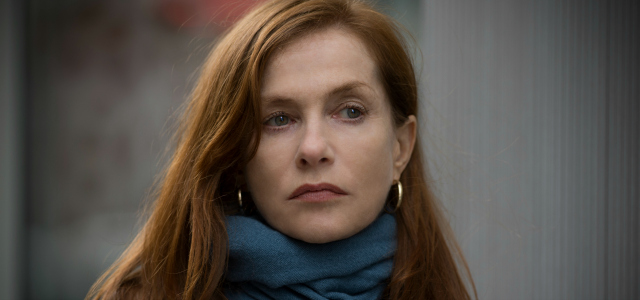Elle
Audacious, challenging and deceptively affirming. This is essential cinema.
Plot summary
Michèle (Isabelle Huppert) is the founder of a successful videogame company. As well as navigating tricky relationships with her mother (Judith Magre), son (Jonas Bloquet) and ex-husband (Charles Berling), she also has to juggle the affections of her illicit lover (Christian Berkel) and her burgeoning attraction to neighbour Patrick (Laurent Lafitte). When one day she is attacked in her own home by a masked assailant, she is dragged into a perverted game of cat and mouse, and forced to re-evaluate her perspective on life.

Paul Verhoeven’s first film proper since 2006’s Black Book begins with a black screen and the sound of breathless panting. The initial impression that we’re overhearing a scene of consensual passion is put to bed once we hear a smash and an aggressive male grunt. And then we cut to our first image: a hulking predator in a black ski mask raping a woman on the floor of what we assume is her home. Once he finishes, he stands up, wipes the blood from his penis and nonchalantly walks out of the door. Our victim lingers for a while, before sitting up, clearing away the broken crockery and running herself a bath. As she leans into the bubbles, a red pool starts to appear on the surface of the water. But she doesn’t bat an eyelid. She simply washes it away and closes her eyes.
Elle makes no bones about setting out its stall. In the first five minutes, it’s clear that the film we’re about to see is one unafraid of upsetting taste, transgressing the boundaries of common decency and juggling seemingly contradictory tones. Indeed, you’ll know straight away whether or not you’ll be able to stay for the full runtime. If you balk at the thought of a Paul Verhoeven rape revenge thriller, leave this well enough alone (you’ll probably be able to catch La La Land again, if you leave now). If, though, you’re open to the thought of the Dutch provocateur grabbing hold of the discourse and bending it to his unique whims, you’re in for an incisive, probing, intellectually-nourishing experience.
For starters, labelling Elle as a ‘rape revenge thriller’ is doing it a tremendous disservice. This identifier reduces it to its most superficially exploitative elements, while tuning out its many ravishing complexities. The key to unlocking these – as is obvious from her titanic awards buzz – is Isabelle Huppert’s performance. Introduced to us as something of a sacrificial lamb, her Michèle is gradually revealed to be anything but: she’s the head of a successful video game company, she wears the proverbial pants in a clandestine affair and she frequently establishes herself as far ballsier than her male counterparts. As she navigates her world, her actions paint her as, alternately, a strong, independent woman, a self-made careerist and – when the situation calls for it – an outright bitch. Not once, though, does she allow herself to be seen as a victim.
This isn’t to say that the gravity of rape is skimmed over, though, or the notion of victimhood diminished. The rape scenes, when they come, are brutish and repugnant, and Michèle is spared none of the violence usually attributed to the act. Her close friends express the requisite sympathy, too, and frequently suggest that she contact the police to pursue legal justice. Only, she never does. Instead of allowing her life to be defined by the heinous act that opens the film, she perpetually rejects the labels society adorns her with. What good would it do to call the police, after all, when it would only act to define her against the actions of a man, and thus play into her attacker’s hand?
Instead, she grabs control of her own narrative. The screenplay, brought to exquisite life by David Birke, delights in undercutting traditional notions of womanhood, refusing to tame his heroine and depriving the audience of easy emotional signposts. Verhoeven, for his part, compliments this perfectly by not only subverting the male gaze but supplanting it with something entirely feminine. We therefore spy on the hunky neighbour with Michèle as she masturbates, watch as she decides how best to portray penetration-by-monster in her latest video game and share her view of each guy in her life as pathetic or lacking in some way. The more she refuses to assimilate into a male-driven perspective, the less her initial rape is seen as defining. In fact, with each successive scene of abuse, she seems paradoxically more and more empowered.
See, for all of his exploitative tendencies, Verhoeven is not interested in mounting some pseudo-feminist wish-fulfilment ‘fantasy’ a la I Spit on Your Grave. Instead, he takes one of society’s sickest and most disturbing problems and uses it to explore how we construct and consume ideas of femininity, sexuality and victimhood. His approach is typically brash and confrontational, but there’s a beating conscience beneath the bravado that is, ultimately, transcendental. Audacious, challenging and deceptively affirming, Elle is absolutely essential cinema.










COMMENTS